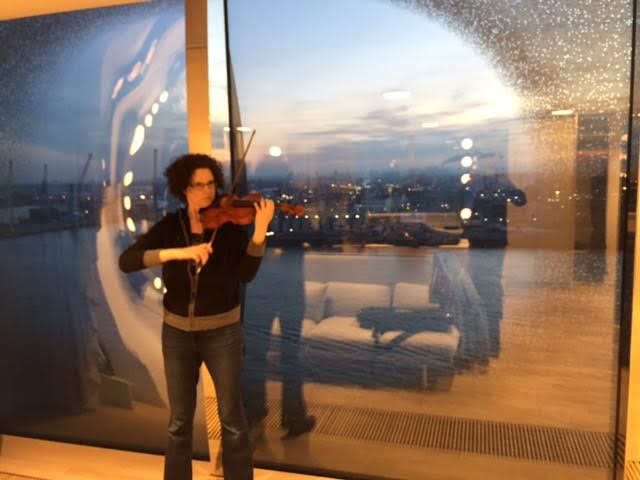The second violin has you in her sights
mainFrom our exhausted diarist, Anthea Kreston:
I am on vacation, relaxing in a rental apartment in Copenhagen, hearing Jason read Harry Potter to the girls in the other room. This last set of concerts of 2017 with my Quartet have been particularly exhausting. The final concert, in Rotterdam, like the previous night at the Elbphilharmonie), faced a packed hall, an eager audience.
As a performer, I look directly out to the audience because I am in the second violin position, my body set parallel to the edge of the stage, on firmly placed feet, balanced yet ready to twist, even travel a bit towards one or the other of my colleagues. I often catch the eyes of individual audience members, and I look around to the faces closely when I come and go from the stage. Beyond the first several rows, or first balcony close to the stage, the eyes turn into glistening pricks – as if I am looking into a dark forest into the eyes of a large pack of wolves. The blinding glare of the stage lights – often from above, the sides, as well as spotlights aimed from afar – never fails to shock me – like the light they shine on you at the dentist – this adds to this surreal visual effect – my colleagues in extra sharp relief, with shadows that cut to their cheekbones like a cubist painting.
The final concert was a different program – instead of Mendelssohn, the concert began with a Haydn (76/1) and the Große Fuge, that night standing alone instead of attached to the rest of the Op. 130 Quartet.
We had tucked rehearsals of this work here and there during the week, but nothing can ever prepare performer or audience for this piece – monumental in the physical demands on the performers as well as the seemingly endless statements of chaotic, beautiful brutalism. This piece tests all of us in that room. The blocks of sound that the writing demands, with the relentlessness of the series of fortes – I imagine him dipping his goose-quill over and over again into his bottle of ink – dip, blot, F – dip, blot, F – dip, blot, F – dip, blot, F……that fugal theme, almost like a tone-row – the clash and then the calm – so much calm that you have to steady yourself every bit as much to sustain the pianissimo as you had to sustain the wall of sound before – but now your whole body is shaking, your eyes dry from lack of blinking, and you are only 1/3 through. Stravinsky once famously said of the fugue that it was “an absolutely contemporary piece of music that will be contemporary forever”.
We played, making it through the treachery, the quiet solitude, the funny bits, the brutality, the intellectual stuff, but when we hit that final, soaring statement of quarter notes, Beethoven’s decision that goodness, in the end, wins; that after struggle is peace; that the chest fills not with anger or loneliness but with triumph and goodwill, I realized that all of us are here, as Beethoven was, and although he would never actually be able to hear the Große Fuge, he could send his deepest thoughts out to each and every one of us in this hall, almost 200 years after he put his quill down for the last time.






Comments